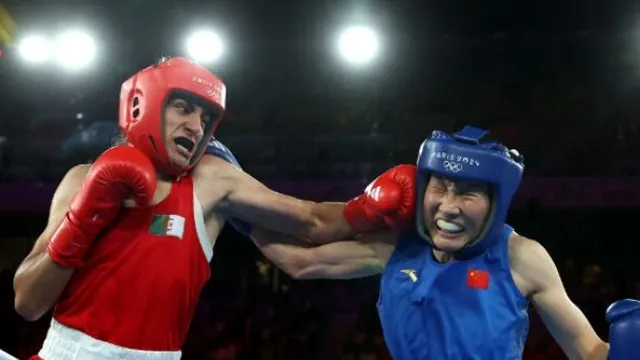
Imane Khelif barred from boxing until passing mandatory sex test
2025-06-02 09:28- World Boxing announced mandatory genetic sex testing for all athletes, impacting Imane Khelif's ability to compete.
- Khelif faces a ban from competing in the female category until passing the genetic screening.
- The introduction of such policies aims to assure athlete safety and uphold competitive fairness in boxing.
Express your sentiment!
Insights
In Algeria, Imane Khelif, an Olympic gold medalist in boxing, has been informed that she cannot compete in any World Boxing events until she undergoes mandatory genetic sex screening. This decision comes in the wake of new policies introduced by World Boxing, which require all athletes over 18 years old to undergo testing to determine their sex at birth. The ruling has sparked significant controversy and debate within the boxing community, particularly regarding the implications for women's competitions, as Khelif was previously allowed to compete under the International Olympic Committee's gender eligibility rules. The controversy surrounding Khelif began during her participation in the Paris Olympics, where she won a gold medal amid scrutiny over her gender identity. This heightened attention resulted from earlier claims made by the International Boxing Association, which stated that Khelif and another boxer had failed unspecified eligibility tests, leading to their disqualification from the IBA’s world championships. Though Khelif competed successfully under prior standards, concerns resurfaced about her participation, prompting World Boxing to adopt stringent sex-testing protocols designed to ensure safety and fairness in competitions. Under World Boxing’s new rules, the test for eligibility involves a polymerase chain reaction (PCR) test that checks for the presence of male chromosomal material. If such material is detected, further examinations will be referred to clinical specialists. These policies were framed as protective measures for athletes in combat sports, emphasizing the physical risks associated with Olympic-style boxing. The results from these tests will determine whether an athlete qualifies for participation in female or male categories, establishing clear sex-based distinctions intended to maintain a level playing field. Khelif was scheduled to defend her title at the Eindhoven Box Cup from June 5-10, 2025; however, her ability to compete is now on hold until the necessary testing is completed and passed. This decision is seen as part of a broader trend within sports organizations to ensure that gender classifications accurately reflect biological sex, and to quell demands from some competitors who express concerns over the safety and competitive fairness in women's boxing. Khelif’s situation has not only drawn attention to the issue of gender identity in sports but has also ignited discussions on the policies that govern competitive eligibility, reflecting the complex interplay of athletics, gender politics, and societal expectations in contemporary sports.
Contexts
Genetic sex screening in sports has become a prominent topic of discussion as it raises critical questions about fairness, equality, and the biological foundations of gender. This practice involves the analysis of an athlete's genetic makeup to determine their sex, often focusing on the presence of certain chromosomes, particularly the X and Y chromosomes. Proponents argue that genetic screening is essential for maintaining a level playing field in competitive sports, as variations in sex characteristics, particularly among individuals with differences in sex development (DSDs), can provide some athletes with an distinct advantage. However, critics express concern about the ethical implications of such testing, including issues related to privacy, bodily autonomy, and the potential for discrimination against individuals whose characteristics do not conform to traditional gender binaries. The International Olympic Committee (IOC) and various sports organizations have implemented regulations surrounding gender identity and eligibility, frequently requiring proof of testosterone levels or sex confirmation through genetic testing. These rules are intended to create fair competition standards but have sparked significant backlash from athletes and advocates. Many female athletes contend that they are being unfairly targeted and that their rights to compete are being compromised based on biological criteria rather than their identity or the sportsmanship they exhibit. The debate has also underscored the limitations of binary sex classifications in a diverse athletic population and highlighted the necessity for policies that embrace a broader understanding of gender that goes beyond simplistic genetic determinism. While genetic testing can provide insight into certain physiological differences, it cannot wholly account for the myriad factors that contribute to athletic performance, such as training, nutrition, and mental fortitude. There is an ongoing discourse emphasizing the need to balance competitive equity with inclusivity in sports. Many stakeholders are advocating for a more nuanced approach that considers hormonal treatments, psychological support, and individual circumstances rather than imposing rigid genetic standards. This perspective is gaining momentum as sports organizations begin to recognize that inclusivity can coexist with fairness, fostering an environment where all athletes can thrive regardless of their genetic predispositions. Looking ahead, it is essential for sports governing bodies to engage in thorough dialogue with athletes, medical professionals, and ethicists to develop guidelines that are fair, equitable, and scientifically sound. These discussions must also consider the cultural, social, and individual implications of genetic testing and the policies surrounding it. As society evolves and our understanding of genetics and gender continues to develop, so too must our approaches to gender classification in sports. The future of genetic sex screening in athletics will likely involve significant legislative and societal shifts, aiming for a balance that respects the diversity of the human experience while safeguarding the integrity of sports.